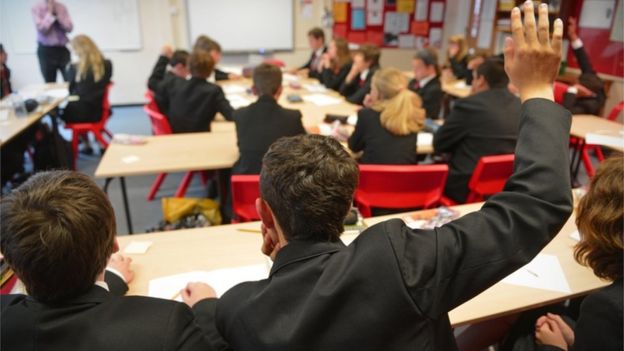
Girls feel they have to choose between being attractive or clever because of sexist name calling in schools, a teachers’ union leader has warned.
It can lead to lessons “with boys talking and girls listening”, said Mary Bousted, general secretary of the Association of Teachers and Lecturers.
Girls too often feel they are on a tightrope, Dr Bousted added.
Students at both single sex and all-girls’ schools were internalising society’s views of women, she warned.
“There are so many names girls can be called – far more than for boys,” said Dr Bousted, speaking ahead of the ATL’s annual conference in Liverpool next week where the issue will be discussed.
‘Multiple pressures’
She said this could lead to a “sorting” of girls and a feeling that it was not possible to be both brainy and feminine.
“Unfortunately this is what some girls think,” said Dr Bousted.
She said there were multiple pressures on girls – to be thin, attractive, compliant and quiet – and that bright girls could be made to feel unfeminine.
“I think sexist bullying is a thing that just doesn’t get talked about.
“For girls, ‘if you are swotty and clever and answer too many questions, you are not attractive’. There’s a very fine line.
“There is a conspiracy of near-silence amongst girls.”
Dr Bousted, a former English teacher, said she had once taped lessons at her school, believing there was a “fairly even split” between the amount the sexes contributed to class discussions.
But when she played the recording back it was clear the boys dominated the debate and girls listened.
She said these attitudes could affect girls’ subject choices and “it can become hard for them to believe they can achieve”.
The ATL conference is due to debate calls for the union to develop a definition of sexist bullying and harassment – and work on resources for teachers to help them deal with it.
Social media
“Schools of course have to promote equality between the sexes but this is not an issue for schools alone,” said Dr Bousted.
“Adolescents today have more access to highly sexualised films and content, on social media, than ever before,” she said, adding that this affected pupils’ attitudes to females and was very hard for teachers to police.
Dr Bousted said she was “very confident” schools were dealing with the issue better than they had a few years ago.
She said it was crucial all pupils were helped to develop good speaking and listening skills to boost their confidence both inside and outside the classroom.

Helen Fraser, chief executive of the Girls’ Day School Trust (GDST), said there was “certainly nothing unfeminine about standing up and making your voice heard”.
She added: “In our increasingly image-obsessed society, it is not surprising that girls feel under pressure to maintain idealised personas but what they look like is only one very small part of who they are.
“By pushing boundaries, asking questions and taking risks, girls can develop a sense of self-worth that is anything but superficial.”
Ms Fraser said gender stereotyping was less prevalent in single-sex schools with 59% of GDST A-level students taking at least one science or maths subject last year.
A Department for Education spokeswoman said the government was “crystal clear” that sexist bullying, like all other forms of bullying, must not be tolerated.
“Every school is required by law to have measures in place to prevent it. We have strengthened teachers’ powers to tackle bullying and have made clear that teachers can discipline and investigate cases of bullying outside school.
“In addition, we’re ensuring all children are better educated about the dangers of the internet, with children learning about internet safety as part of the new National Curriculum.”
[Source:- BBC]


